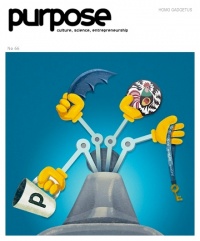
On the Margin
Culture as an environment for the development of social economy
Goals and presuppositions of cultural animation allow to achieve a compromise between the desire for independence and desire for feeling a communion. Animation according to its meaning encourage to participate in social life and organizes it into a form of mutual relationships. To that end it uses an obvious characteristic of human relationships – that a man is inherently a social animal. Encouraging people to work for the community is often underpinned with slogans of self-development, as well as increased impact on the community to which they feel affiliation. Such activities affects not only intensification of sense of integrity with one's world view, but also are of significance for developing human relationships.
Why, however, culture is an ideal space for the development of community life, being also the foundation for the construction of social economy concept? If we understand culture as the totality of human creations - the whole of the spiritual and material achievements of society - we will see that it is impossible to avoid contact with this highly fertile soil. Completing this thesis with man's creative inclinations, we will understand the aim that animators are inspired of. A process of activation of human potential would not be possible without the need to create a situation where everyone would feel obligated to actively influence the world around him. Because acting alone usually does not produce measurable results, the entire structure must be built of the inextricable social bonds, which will become the basis of the community.
Another point of integrating these conclusions is the economy, which comprise another side to those activities. If the animation is a practice which enables to achieve, through joint action, both individual and group independence, goods produced in this process must be skillfully distributed and consumed. Those activities are ordered by economics, which also focuses on employment opportunities, ways of participating in culture, the cultural industries and researching of its impact. Economy of culture is therefore a chance to study processes that accompany the desired result, and more importantly - helps to specify about the role of the culture in today's society.

Examples of gadgets produced by Osikowa Dolina collective, Photo: Osikowa Dolina
A very interesting way to find the golden mean between the idea and the economic aspects is a model of social enterprise, which functioning is regulated by social economy. It is the way for alternative economic activity, which combines social and economic goals. In principle, profits should be reinvested in the statutory purposes of the organization or devoted to the community, however, indicating that it may not serve to increase income or maximize profits. The most essential criterion for determining the entities of social economy is a bottom-up nature of the initiative, which emphasizes the social aspect of running business. Not without significance is the democratic system of governance which makes all members equal.
How the culture can become the basis for the development of social economy entities? It is perfectly illustrated by the activities of the Society for Creative Initiatives "ę", which was founded in 2002 and since then implements socio-cultural projects throughout Poland. As the members themselves admit, the art is for them a tool of social change. The association was founded on the belief that it is worthwhile to pursue one's passions, develop, and at the same time meet other interesting people. The observation of what people's leisure-time activities may be gave rise to the idea of stimulating these activities and make them bring measurable benefits to their originators. At the beginning it was about reaching out to small towns where it is difficult to find substantial assistance in creative activities for young people. Distributing cameras and discovering young talents among the inhabitants made a lot of fun for them, and it became the nucleus of larger operations coordinated by the Society for Creative Initiatives "ę" in Warsaw itself.
The project "Young managers of culture" was aimed at young people from across Poland who would like to learn how to organize events, and then how to manage events with a particular amount of subsidy. The effect of the meeting was amazing. Young people got the bug of animator and have created their own concepts of projects. Thanks to those meetings Orbis Pictus Theater in Poznań came into being, among other things, and film screenings, photo exhibitions and meetings with artists were organized. It turned out that the culture has a power to attract people and arouse creative interactions in them. Society for Creative Initiatives "ę", however, is a proposal not only for the young people.
Organization of subsidy contest, which realization was financed by the Polish-American Freedom Foundation, has brought the Society a great fame. The aim of the project "Seniors in Action" was to find active people over 55 years old that would be willing to share their passions with others. Friendly format of the program was helping elderly people to cooperate with the selected non-profit organization or institution - associations, foundations, culture houses, libraries or even housing associations. The effect of that action was launching in Poland a variety of projects that involve the potential of seniors. The project helped to break the stereotype that elderly people can not use the free time creatively. It has also reinforced the belief that the retired life is not over, and one can with great enthusiasm share their skills with others.

Examples of gadgets produced by Osikowa Dolina collective, Photo: Osikowa Dolina
The big advantage of activity of social economy entities is focusing attention on professionally disadvantaged people. For example, a difficulty with integrating into the labor market after giving birth can be solved by joining MaMa Foundation, whose mission is to bring help in obtaining financial independence. Members are calling: "become an artist and start earning money!". For the interested moms there are numerous psychological and motivational workshops and business and professional trainings that prepare for the production of regional souvenirs for tourists. The main objective of this project is to motivate the participants to start their own cooperatives, which will sell the products of their own work. The two-year social project "Cooperative of Moms" is also an aid in the distribution and access to materials.
The proof that the arts and crafts may be the result of work of people involved in one project subordinated to the principles of social economy is also the Osikowa Dolina, bringing together people of a similar objective of activity. The appearance of works of the members of this cooperative in the HAND MADE by POKL publication makes possible to introduce products they offer to a much larger group of people, in addition interested in the promotion of their business through works of Osikowa Dolina. Product of human hands assuming the proportions of gadget that can serve corporate identity. Profits from this type of cooperation the cooperative can allocate for the statutory purposes and dispose of them in a predetermined way.
In the examples of culture involved in the formation of the social economy entities, concepts such as association, foundation, cooperative has emerged. What do they have in common and what is the difference between them? A foundation and an association are the two most common forms of non-governmental organizations. The basic difference is the number of persons required for its establishment. A foundation, unlike an association is impersonal (has no members). Its main advantage is the independence from individuals, much more accentuated than in any corporations. Only the creator determines the goals, assets and mode of action. An association, on the other hand, is a group of people with common goals or interests. This arrangement is very comfortable, especially when we consider the non-profit activities of such organizations. On a slightly different basis, in turn, the functioning of a cooperative is based on, which is a voluntary association of an unlimited number of persons, which composition, as well as share fund are variable. An important aspect that functioning of a cooperation is based on, is running the joint economic, social and cultural-educational business in the interests of its members.

Examples of gadgets produced by Osikowa Dolina collective, Photo: Osikowa Dolina
Culture-making potential of entities of social economy was noticed by National Audiovisual Institute, which in September 2011 organizes a European Congress of Culture. Within the framework of this event free workshops are waiting for the representative of NGOs (non-governmental organizations). Among others, there will be: Pecha Kucha – meetings for non-governmental organizations organized to present new projects and take up a cooperation, Generator of Ideas - workshops with participation of the webmasters, computer scientists, designers, artists, sociologists, cultural anthropologists, media representatives and non-governmental organizations leaders, Reverse Pedagogy - joint efforts of artists and people of different competencies of creativity, that will be crowned by an exhibition. There is an obvious need of taking up the bottom-up initiatives and of an attempt to influence their best development possible.
Greater and greater popularity of business based on social economy makes more and more people want to develop within it. The market has already started verification of the demand on cultural goods - more and more people take part in festivals organized by non-governmental organizations, more and more ideas for cooperatives come into being, which in turn have more to offer to potential purchasers of their services. A thesis that culture is an ideal environment for the development of social economy can be also presented in a perverse way. It is entities of social economy who - by engaging the public and encouraging to creative activity - influence the development of culture and its positive reception.
There are many supporting projects that come into being in aid of social economy, One of them is "socially means economically - a strengthening of the social economy sector in the Łódź region by establishing the Regional Social Economy Incubator that provides a comprehensive support". Within the framework of the project the Regional Social Economy Incubator came into being, which is composed of employees of the European Institute in Łódź, in cooperation with the institutions and entities of the social economy and individuals. The aim of its creation was to create a platform for cooperation, promotion and to enable sharing of information between entities of social economy. This allows people at risk of losing their jobs to have a chance of taking part in trainings, consultancy and use legal, accounting and marketing services.
In order to increase effectiveness of their activities, social economy entities may use consultancy or trainings offered by European Institute, which supports organizations that are operational in the Łódź region. Joining the network of Regional Social Economy Incubators allows to use the refund of accounting, marketing and legal services. Further information can be obtained from Project Point of Contact by phone number (+48 42) 291 03 16 or in person at the office at Piotrkowska Street 262/264, room no. 15 and on the web page www.ie-ries.pl.
Text: Karina Forjasz
Check the archive

no 66 August 2012
theme of the issue:
Homo Gadgetus
< spis treści
Article
From Editors
Presentation
Hand Made by POKL
Analysis
Homo gadgetus - Artur Zaguła
Culture Industries
Polish way gadget - conversation with Elżbieta Roeske – Director of Product Group of arena DESIGN and Barbara Vogt – Director of Gift Expo Fair - Piotr Komorowski.
Workshop
A good gadget - Maciej Mazerant
On the Margin
Culture as an environment for the development of social economy - Karina Forjasz





